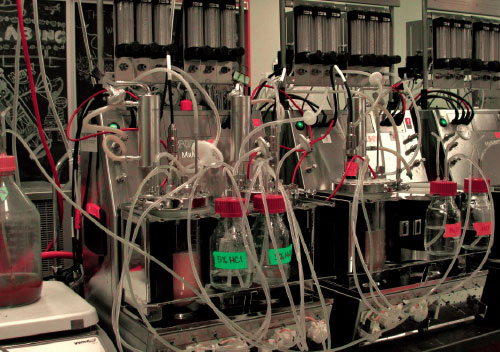ARCHIVE EQUINE NEWS STORIES
| Current news is available at TheHorsePortal.ca, Equine Guelph's online learning platform for practical, quick learning. Given the vast amount of information on horse health and welfare, Equine Guelph has archived its past news articles from 2002-2020. They are listed below, along with a search function available to find specific healthcare topics. | |
Teaming up to Go with the Gut: Horse and Human Investigations January 2018
Story: Nicole Weidner
Horse owners know the importance of team work. When your partner weighs 1000 pounds, the importance of listening to and learning about their perspective is clear. Teamwork is also important when it comes to research, and is the driving force behind many important scientific discoveries. At the University of Guelph, 2 researchers with expertise in different areas have teamed up to learn more about the gut bacteria of horses. The research is a collaborative effort between Dr. Luis Arroyo, a researcher and clinician focused on large animal health, and Dr. Emma Allen-Vercoe, whose main focus is on links between the gut microbiome and health in humans.
Links between the gut microbiome and human health have gained much attention in the past few years. Changes in the human microbiome have been linked to obesity, diabetes and more. These findings spurred researchers to investigate the microbiome in horses, and many now believe that the microbiota are key to understanding horse health and diseases, such as colic. The researchers hope to use an in vitro system known as Robogut, developed by Dr. Allen-Vercoe, to answer questions about the gut bacteria in healthy horses and those affected with disease, such as colitis. Robogut, a combination of beakers, tubes and monitors, simulates the human gut and allows researchers to explore the human microbiome. For instance, Robogut has been used to investigate the impact that high protein diets have on the microbiome when compared to high fibre diets.
Both researchers emphasize key differences between horses and humans that will need to be accounted for when transitioning Robogut from a simulated human gut to a horse gut. For one, horses generally have a more standardized diet than humans. Many humans eat vastly different meals each day. Different nutrients have different and often rapid impacts on your microbiome. Setting up Robogut for horses may be more straightforward in this respect, as the researchers will not have to account for such a large amount of variation. However, the unique characteristics of the equine digestive system may also make setting up Robogut more complicated. “Horses are hindgut fermenters, and rely on the bacteria in their cecum and colon to produce as much as 70% of their energy needs” says Dr. Arroyo. Since the intestinal tract of the horse is much different than humans, researchers first need to understand what conditions are necessary for microbial growth in horses, to ensure that Robogut’s experimental set up accurately reflects that environment. Dr. Arroyo is currently overseeing the research that will answer these questions.

First, fecal samples were collected from healthy horses and horses with colitis. DNA sequencing was completed on the samples to determine and compare the microbes present in the intestinal tracts of these horses. Researchers also grew the samples under different experimental conditions, to understand how these conditions would affect the growth of different microbial species. The samples were grown using close to 50 different media types (this changes the nutrients that the bacteria feed on), and under aerobic and anaerobic conditions. Researchers then harvested the samples, and are currently completing DNA sequencing. From these experiments, comparisons can be made between the original samples collected from the horses, and those grown by the researchers, to determine which conditions resulted in optimal microbial growth. These comparisons will help Drs. Arroyo and Allen-Vercoe determine the right experimental conditions to use for Robogut to mimic a horse gut.
Although the differences between horses and humans can make experimental set up more time consuming, studies in humans can often help researchers identify new areas of investigation in horses. For example, scientists now believe that many cases of colitis in humans are due to imbalances in the microbiome, and not pathogens as was previously thought. These findings guided the research into microbiome and colitis in horses, including this project. Dietary change has also been linked to effects on the microbiome in humans. Dr. Allen-Vercoe cites a study performed in her lab where a switch from a high protein diet to a high fibre diet did not affect the composition of the microbiome, but resulted in rapid changes to the abundance profile. This area is now being investigated in horses as well. Instances of antibiotic use, stress and bottle feeding with milk substitutes can also be found in both species. These have all been associated with effects on the microbiome in humans and are now areas of interest in horses as well. Dr. Allen-Vercoe adds weaning as a topic of interest, stating that “weaning can cause a lot of stress to the foal, especially if it is done too early or is forced. This stress combined with change to the diet can have a rapid and huge impact on the microbiome, and may be a cause of diarrhea seen in foals.” Dr. Allen-Vercoe believes weaning should always be done very slowly in all species to prevent these negative effects.
Dr. Arroyo is excited to get back the results of the initial experiments. He says “these results will help us understand what a healthy horse microbiome looks like, and will make sure that our experiments with Robogut will be of the utmost value.” The future for research into the horse microbiome certainly looks promising with the help of Robogut. Stay tuned with Equine Guelph for updates on the project!
This research is supported by funding from Equine Guelph, Emerging Leaders of Latin America and The Natural Sciences and Engineering Research Council of Canada (NSERC).